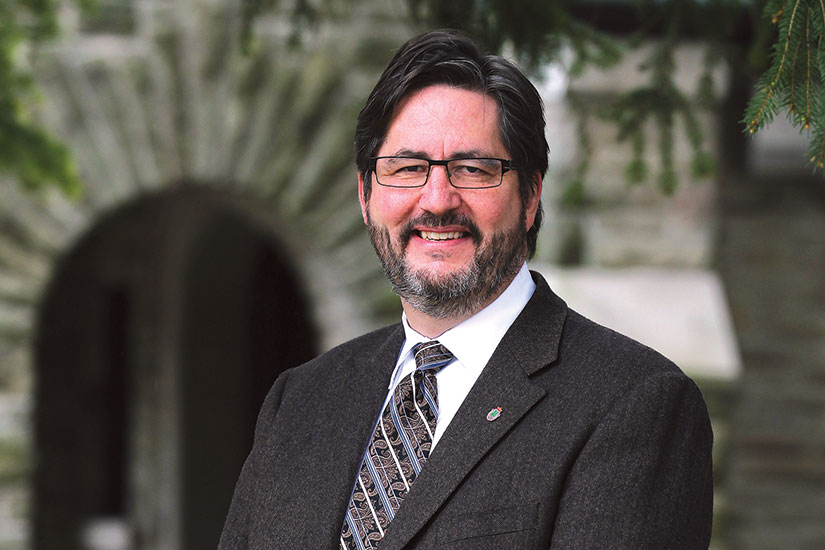Kersch learned this wisdom only after he had earned his PhD and entered the Basilians. That’s when the order sent the bright, confident young Kersch to Mexico for his novitiate.
“I fought tooth and nail against that and it was the best thing that ever happened to me,” he said.
Kersch didn’t speak Spanish. In Mexico, nobody cared about his doctorate in political science. He went from being the smartest guy in the room to the guy who couldn’t be trusted to buy groceries by himself.
“Through hard, learned experience, I realized the benefits of being outside your comfort zone — the educational, spiritual benefits of being outside your comfort zone,” he said.
Twenty years on, Kersch now believes you haven’t had a Catholic education until you’ve experienced the world. He and other Catholic university administrators across Canada are banding together to provide expanded opportunities for Catholic undergraduates to get out of Canada, experience other cultures, meet new people and study the world first hand.
The Association of Catholic Colleges and Universities of Canada has been working on offering students at all 18 Catholic institutions from coast to coast service learning opportunities. Any student at any Canadian Catholic college can get in on trips organized at other Catholic colleges where they will have the opportunity to volunteer and to learn.
These trips aren’t just glorified vacations to exotic locales, said King’s University College principal David Sylvester.
“You can’t be a voluntourist,” he said. “You can’t just show up and cry ‘Viva la Revolution!’ and then go back home to your couch and watch your flat-screen TV.”
Serious academic preparation goes into the trips and credit is granted. But service learning is only part of a larger thrust at Canada’s Catholic colleges to internationalize the entire educational experience. Universities welcome larger numbers of international students. Agreements between universities around the world allow students to enrol in courses at sister institutions. A year at the Pontifical University in Sao Paulo or Vienna’s University of Applied Science counts toward your University of Western Ontario degree at King’s.
In Edmonton, Kersch is working on an agreement with Bethlehem University that will allow St. Joseph’s College students to study the Bible for a semester in the city of David and birthplace of Christ.
“As a mandate, as a philosophy for universities, internationalization is more important than ever. We recognize that learners need to be part of a world framework,” said St. Mary’s University College president and vice-chancellor Gerry Turcotte. “It’s very hard to be a citizen of the world if you just live only in your backyard and never venture further.”
It’s an ethos that has to be embraced by the whole institution — administration, faculty and students — said Turcotte. Faculty exchanges, such as the agreement that has sent St. Mary’s Catholic Studies chair Michael Duggan to teach and research at the Ukrainian Catholic University in Lviv, are also important to creating Catholic universities with a truly catholic (universal, global) ethos.
 King’s University College principal David Sylvester.
King’s University College principal David Sylvester.
“The idea is certainly that cross-culturalization is important across the board,” Turcotte said. At Catholic universities, just talking about social justice won’t cut it anymore in a globalized world.
“That drive for social justice means encountering the world where it is, not just finding it in textbooks,” said Turcotte. “The engagement with other cultures is hardwired into the Catholic DNA.”
It’s an engagement that also has to happen at home, on campus. At King’s in London, Ont., there are 500 exchange and international students. For 14 years the college has put on an annual cultural festival to celebrate the global range of cultures on campus. King’s students and faculty are working together to sponsor refugees.
At King’s, internationalization is a very Catholic thing. King’s has a working partnership on teacher education with the Catholic universities in Brazil. It is hosting exchange students from such Catholic institutions as Australia’s University of Notre Dame, Japan’s Jesuit-founded Sophia University, Erasmus University in the Netherlands and the Université Catholique de Lille in France.
“We share a philosophy of education that links us together,” said Sylvester. “It doesn’t matter what language we’re speaking, we’re talking about educating people not just subjects — as our mission says, for the pursuit of truth, for the edification of humanity, for social justice. We all start from that perspective.”
At St. Thomas More, federated with the University of Saskatchewan, internationalization done right is how the college stands out as distinctively Catholic, said associate dean Darrell McLaughlin.
“We’ve been quite deliberate … providing opportunities for students to go to the two-thirds world and encounter people with different histories, different cultures — live in their homes and communities, work with them and hear their stories of hope and disappointment, and through that process discover their common humanity,” McLaughlin said.
Guided by the life-work and spirit of Jean Vanier, St. Thomas More has hooked up with Intercordia Canada, giving students the chance to serve in L’Arche communities for people with intellectual disabilities around the world.
“In a climate of globalization, where boundaries of all types are becoming more porous and less distinctive than they were in the past, it’s essential that there’s some humility all the way around, on students’ part as well as on the institution’s part,” McLaughlin said.
A cynic might think the Canadian universities are filling their classrooms with international students to fill their coffers with the higher fees those students bring.
“I haven’t heard one of my colleagues talk about the importance of internationalization as a financial piece. It’s something that’s understood as almost a duty of the Catholic mandate,” said Turcotte from Calgary. “The concept of that closed world has really been exploded in the last few decades…. It’s why the Catholic universities do so well – these amazing petri dishes of world thought. If you’re doing it right, you’re bringing the world to the campus.”
Sylvester agreed “it’s not about money,” but admitted international students “are an important source of revenue for any university, especially in the face of declining grants. And this year we’re facing a cap — the provincial government has frozen grants to universities, so every university relies on this.”
International students generally pay two to two-and-a-half times the average tuition of a Canadian student.
“What people don’t realize is that the international fees usually help to provide access for domestic students, because it helps to cover those costs that are often underfunded by government agencies,” said Turcotte.
Last year in China, Sylvester held alumni events for Chinese students who graduated from King’s 16 years ago. The students travelled to meet up again, share memories and their pride in their Canadian alma mater.
“We don’t think of them as just colleagues. They’re friends,” said Sylvester. “We have long-term friendships…. It makes for a better university experience, it makes for a better university and it makes for a better society, frankly.”


